Former US President Carter passed away: He had a "China complex" and established diplomatic relations with China during his tenure
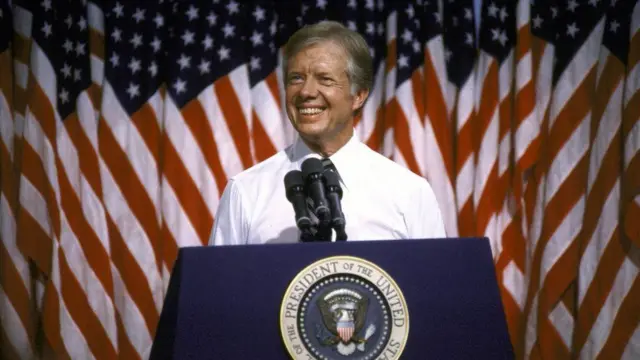
- BBC news in english.
Former U.S. President Jimmy Carter died at the age of 100 on Sunday afternoon (December 29) at his home in Plains, Georgia. The Carter Center announced the news.
Carter served as the 39th President from 1977 to 1981 and is the longest-serving President in U.S. history.
U.S. President Joe Biden said, "America and the world have lost an extraordinary leader, statesman and humanitarian," and described Carter as "a man of principle, faith and humility." President-elect Donald Trump said, "The challenges Jimmy faced as president came at a critical time for our country, and he did everything he could to improve the lives of all Americans. For this, we all owe him a debt of gratitude."
During his term in office, Carter facilitated the establishment of formal diplomatic relations between the United States and the People's Republic of China. He was a president with a "China complex". He had been fascinated by China since he was a child, visited China many times after leaving office, and was still paying attention to China until a few years before his death.
While in office, Carter signed the historic Camp David Accords, which helped bring peace to the Middle East. After leaving office, he devoted his career to defending human rights and public service. In 2002, he was awarded the Nobel Peace Prize.
Liu Yawei, director of the Carter Center's China Program and adjunct professor of political science at Emory University, told the BBC, "President Carter is a courageous, farsighted and wise president. His courage far outweighs his consideration of real political interests. His significance will become increasingly important as history goes by."
Carter's "China Complex"
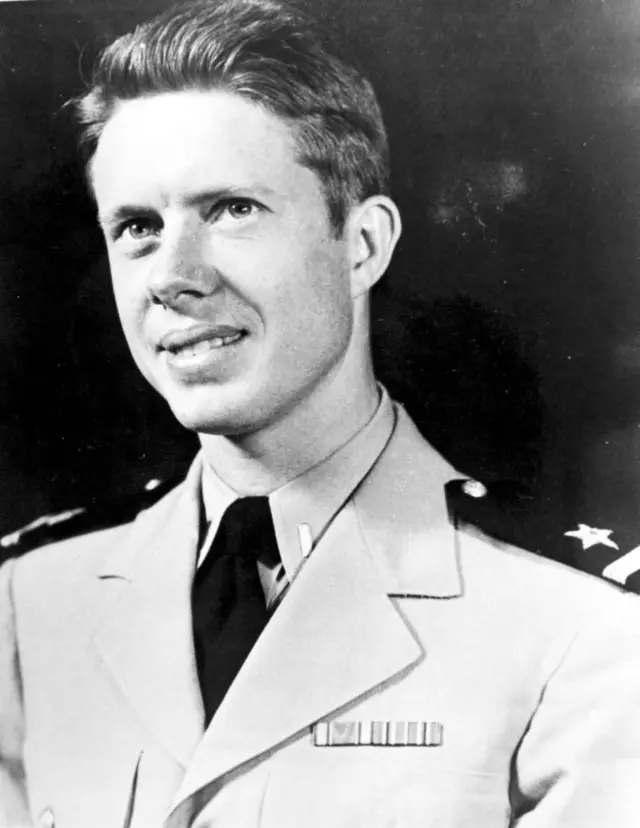
Carter, born on October 1, 1924, can trace his understanding of China back to his childhood.
His uncle served in the U.S. Navy and was stationed in China. He would send postcards to young Carter from time to time, giving him his first memory of China.
As a Christian, Carter also learned from missionaries that China was poor and backward and needed help, so he donated some money every church service to support the missionaries' work in schools and hospitals in China.
Later, Carter became a sailor in the US submarine force and followed the troops to some port cities such as Qingdao and Shanghai in the late Chinese Civil War. There, they conducted anti-submarine warfare exercises with ships from the Kuomintang regime, Australia, Great Britain and the United States. This experience rekindled his interest in China and he began to pay continuous attention to Chinese history.
Carter and his troops were originally intended to give some psychological support to Chiang Kai-shek's regime and try to prove that the communist forces had not yet completely controlled the mainland, but they witnessed the crumbling of the Kuomintang rule.
"We could see Mao's Communist troops lighting bonfires on the nearby hillsides and watched the Nationalists forcibly conscripting little boys and young men at gunpoint," Carter wrote in a biography.
Later, the Chinese Communist Party won the civil war and established a regime in 1949, and the Kuomintang retreated to Taiwan. For the next 30 years, the United States continued to recognize the Republic of China in Taiwan as the only legitimate government of China.
“The week that changed the world”
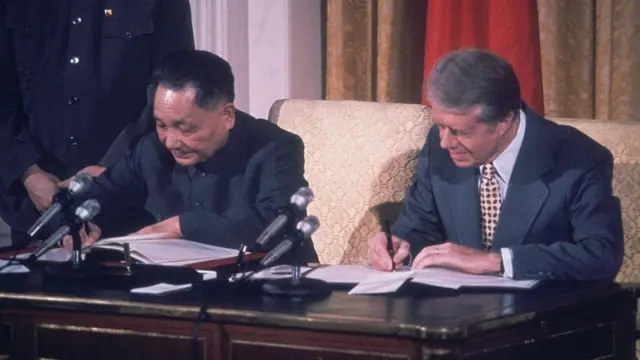
Since entering the White House in 1977, Carter has been looking for opportunities to establish diplomatic relations with the People's Republic of China.
"I knew that the United States Constitution vested the sole power of diplomatic recognition in the president, and I was determined to exercise that power if an appropriate agreement could be reached with the leaders of China regarding the treatment of the people of Taiwan," Carter wrote in his biography.
Pressure from the U.S. Congress and Taiwan lobbying groups convinced Carter to take personal charge of engaging with China. He appointed Leonard Woodcock, then president of the United Auto Workers and known as a "negotiation expert," to conduct secret negotiations with China. They bypassed the State Department and sent letters and cables directly from the White House to the representative in China.
Several months passed without any progress in the negotiations. Later, Carter sent Zbigniew Brzezinski, then the national security adviser and an "anti-Soviet general", to the United States. Finally, on January 1, 1979, the two countries formally established diplomatic relations.
Carter also attributed the successful establishment of diplomatic relations to China's then-leader Deng Xiaoping.
"We were so impressed by Deng Xiaoping and his quick action that he agreed to accept our one-year treaty with Taiwan, pledging that China would not refute our statements on a peaceful resolution of the Taiwan issue and agreeing to sell defensive weapons to Taiwan after the treaty expired," Carter noted in his biography.
Deng Xiaoping visited Texas in February 1979, and his image wearing a cowboy hat impressed Americans. Deng Xiaoping assured Carter that he would reform and open up China, which coincided with Carter's idea of promoting China's integration into the international community.
The two countries established diplomatic relations seven years after former US President Richard Nixon’s famous visit to China in February 1972. During this period, the Watergate scandal hindered the establishment of diplomatic relations between the United States and China. Even when President Ford visited China in 1975 and was received by Mao Zedong and Deng Xiaoping, diplomatic relations were not established.
During his visit to China, President Nixon and then-Premier Zhou Enlai signed the Shanghai Communiqué, laying the foundation for the normalization of bilateral relations. His visit is often referred to as "the week that changed the world."
China seemed to be too obsessed with Nixon's visit to China and the previous secret visit by then-US National Security Advisor Kissinger , which to some extent weakened the significance of Carter's establishment of diplomatic relations with China.
Liu Yawei of the Carter Center believes that this is partly because Carter made human rights strategy the cornerstone of US foreign policy after entering the White House, and human rights are China's weakness. In addition, Carter once promoted the supervision of grassroots democratic elections in China at the Carter Center, and China may have thought that he came to China to carry out peaceful evolution at the behest of the US government, thus making a misjudgment.
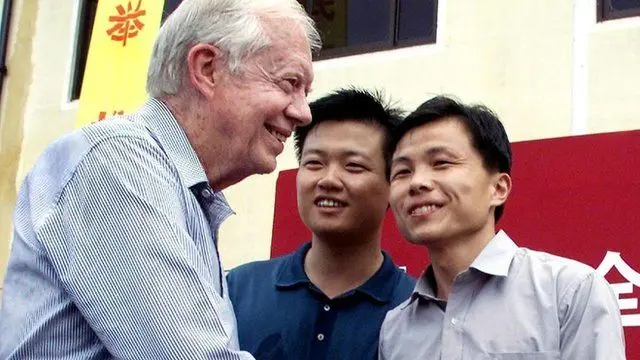
In addition, the Taiwan Relations Act, enacted by the US Congress, was passed during Carter's presidency, which also made him controversial in China. The Act allowed the United States and the Taiwanese people to continue to maintain economic and cultural relations after the severance of diplomatic relations between the United States and Taiwan, and stated that US policy included "providing defensive weapons to Taiwan." Since then, the United States has repeatedly sold weapons to Taiwan based on this Act.
Even so, Carter achieved the establishment of diplomatic relations between the United States and China in 1979, and the relationship between the two countries entered a new era.
Liu Yawei said that if Kissinger's visit to China was an "ice-breaking trip" that broke the state of non-interaction between China and the United States for more than 20 years from 1949 to 1971; then Nixon's visit to China was equivalent to "opening a window" that allowed China and the United States to look at each other; and in the end, it was President Carter who "pushed the door open."
Carter also regarded the normalization of U.S.-China diplomatic relations as "the most important and long-term achievement he had accomplished during his time in the White House."
"There hasn't been any war in the Pacific since 1979, in part because of our good relationship with China," he said in an interview with Voice of America.
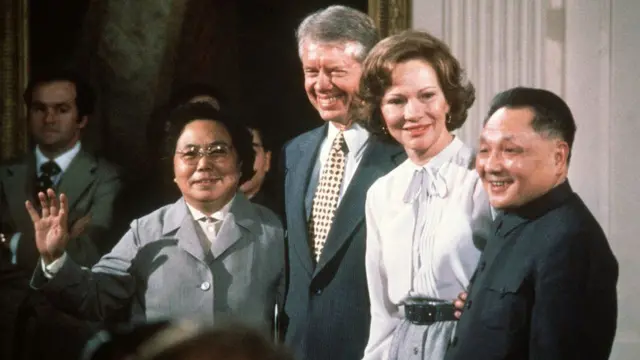
Political cost
Establishing diplomatic relations with China also caused President Carter to suffer heavy political pressure and he paid a price for it.
Barry Goldwater, then a U.S. Senator from Arizona, and others sued Carter in federal court on charges of unconstitutionality, claiming that the president could not bypass Congress to sever diplomatic relations with the Republic of China.
In fact, while respecting Congress is a basic tradition, the US president does have such right.
Congress passed the Taiwan Relations Act with a high vote, continuing to promise and undertake to protect Taiwan. This move dealt a heavy blow to Carter's ability to govern.
In the 1980 presidential election, Carter won only six states, while his opponent Ronald Reagan won 44 states.
Another factor that led to Carter's defeat was the hostage crisis caused by the Iranian Revolution in 1979. At that time, the US Embassy in Iran was occupied and dozens of American diplomats and civilians were held hostage. The rescue process was not smooth, and many people believed that Carter was incapable of handling such incidents.
In addition, Carter was in office at a time when the U.S. was experiencing severe inflation. He failed to control the rapidly rising prices, which further led voters to question his ability to govern.
David Greenberg, an American historian and professor of history and news media studies at Rutgers University, wrote that "Carter had many admirable political views and instincts, but if his presidency were evaluated, it would probably rank at the bottom, or at best, average."
"It's fair to say that he governed America at a very difficult time. He was remembered for recognizing a 'crisis of confidence' at a time when morale in the country was low, but he was also unable to resolve that crisis."
The meaning is ever-lasting
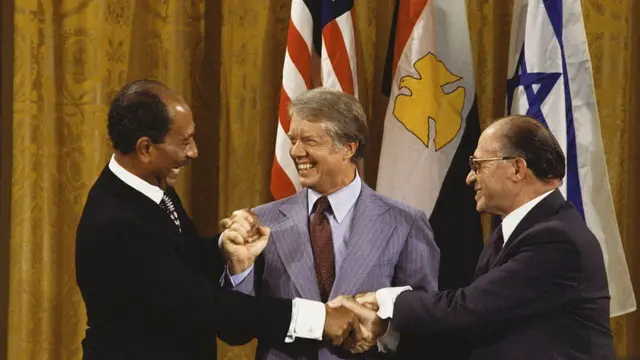
The meaning that Carter brought to the world becomes more and more lasting as time goes by.
In diplomacy, he brokered the historic Camp David Peace Accords between Israel and Egypt, which was key to preventing war in the Middle East and paved the way for dialogue between Israel and some Arab countries.
He also signed the Panama Canal Treaty, which ended nearly a century of U.S. control of the Panama Canal and returned the canal to Panama, which was seen as a major benefit to U.S. policy toward Latin America.
In the United States, Carter was considered a "green president" for his tough stance on environmental issues. He promoted important legislation on land protection and established the Department of Energy - before this, US presidents had influenced energy policy through committees or Congress, rather than a centralized administrative agency.
He recognized the country's need for renewable energy and emphasized the benefits of solar energy by installing solar panels on the roof of the White House. In a national address, Carter, wearing a cashmere sweater, said that the heating in the White House had been lowered by several degrees, urging every American to follow suit, which would save a lot of energy.
Carter attached great importance to diversity. During his presidency, he appointed many minorities and women to important administrative and judicial positions, including more than 40 women judges. Joan Ruth Bader Ginsburg was appointed by him and later became the second female justice in the history of the United States Supreme Court.
After leaving the White House, Carter and his wife founded the Carter Center in Atlanta, dedicated to promoting human rights, monitoring global elections, and fighting poverty. He continued to expose the phenomenon of wealth disparity and the abuse of women and girls - he believed it was the world's worst human rights violation.
These efforts, along with the earlier Camp David Accords, were recognized by the Nobel Committee, which awarded Carter the Nobel Peace Prize in 2002. The award citation said he had "worked tirelessly over decades to find peaceful solutions to international conflicts, to advance democracy and human rights, and to promote economic and social development."
After leaving office, he continued to have a "China complex"
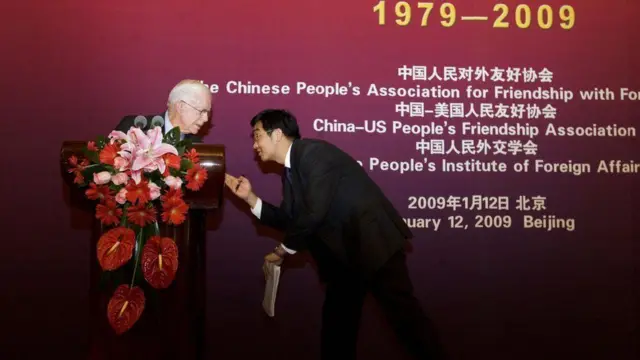
Unlike other US presidents, Carter continued to maintain close ties with China after leaving office.
He visited China many times as a former president. According to Liu Yawei of the Carter Center, Carter visited China at least a dozen times between 1981 and 2014, and the number of projects at the Carter Center in China increased especially after 1997.
"No other American leader has had such a complex relationship with China after leaving office. In Carter's own words, he is a witness to China's reform and opening up," said Liu Yawei.
Fast forward a few decades, and the current US political arena has almost completely negated the engagement policy of previous presidents towards China, which inevitably makes the president who established diplomatic relations feel regretful.
Professor Liu Yawei said that he had received two calls from President Carter, the second time during the COVID-19 pandemic in 2021. Carter, who was 97 years old at the time, said that Chinese students applying to study in the United States could not get visas, and asked him if he could find someone within the Biden administration to solve the problem.
Liu Yawei told him, "Why are we looking for someone in the Biden administration? You are a veteran of the Democratic Party. If you want to find Biden, just write to him directly."
Later, the Carter Center drafted a letter and received Carter's revisions and approval on the same day. The next day, it was delivered to Biden through Blinken, who was nominated by Biden as Secretary of State.
"I have been at the Carter Center for 20 years, and I have never seen a letter from President Carter completed in one day," Liu Yawei said. Despite his advanced age, he "is always paying attention to the Sino-US relations that he personally initiated."555
Comments
Post a Comment